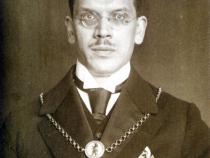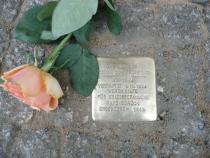Location
Schönhauser Allee 130
District
Prenzlauer Berg
Stone was laid
June 2009
Born
14 December 1884 in Berlin
Occupation
Krankenpfleger / Stadtverordneter
Murdered
1945 in der Umgebung Berlins
„I want to focus on another disadvantage of the increase in the number of cars today and that is air pollution. We should remember that many hard-working Berliners see their way from home to work as their only chance to get some fresh air and we should ensure that this is protected.“
Georg Streiter to the city council, 4. 6. 1925
Georg Streiter was the son of a housekeeper, Wilhelmine Schulz, who worked for a grocer, Carl Ludwig Streiter. They later married, making her children legitimate. As a teenager, Streiter joined the Protestant youth association for social work. After finishing a commercial apprenticeship, he decided to become a male nurse. On 18.10.1903, the 19-year-old took over management of the expressly Christian German nurses’ union to which he was elected president in 1907. In 1910, he published a paper entitled The economic and social situation of nursing staff in Germany, the first academic work on this subject. From 1914 to 1918, Streiter worked for the Red Cross in war zones in Belgium, Poland and Turkey. He received decorations from Prussia, Austria and Turkey for his services. He was one of the founding members of the German People's Party (DVP), founded on 15.11.1918. He was elected to the executive board and represented the DVP in the city council. He remained a member of Prenzlauer Berg local council after leaving the city council. From 1921 to 1924, he was DVP spokesman for health policy in the Reichstag and from 1926 to 1928 he was a member of the Prussian state parliament. In all these functions, as in the many committees and associations he was a member of, Streiter worked consistently to improve nursing and welfare work. The German nursing society, which was set up to this end in 1927, was dissolved by the Nazis in 1933 and its newspaper banned. In 1935, Streiter found employment with the executive body of the German Red Cross, where he was responsible for Polish and French prisoners of war from 1940. On 1.11.1944, he was arrested at work and accused of illegally sending letters for prisoners of war. After 1945, his son found out from one of his father’s colleagues that Streiter had probably been shot in a concentration camp near Berlin in the last weeks of the war. The Red Cross, which ran an international tracing service to find out about the fates of missing people, refused to give his son any information.
Georg Streiter was a city councillor in 1919 (Bürgerliche Vereinigung); 1920 (Bürgerliche Vereinigung)/Constituency 4, Prenzlauer Berg (DVP); 1921 – 1925, Constituency 4 Prenzlauer Berg (DVP)
Georg Streiter to the city council, 4. 6. 1925
Georg Streiter was the son of a housekeeper, Wilhelmine Schulz, who worked for a grocer, Carl Ludwig Streiter. They later married, making her children legitimate. As a teenager, Streiter joined the Protestant youth association for social work. After finishing a commercial apprenticeship, he decided to become a male nurse. On 18.10.1903, the 19-year-old took over management of the expressly Christian German nurses’ union to which he was elected president in 1907. In 1910, he published a paper entitled The economic and social situation of nursing staff in Germany, the first academic work on this subject. From 1914 to 1918, Streiter worked for the Red Cross in war zones in Belgium, Poland and Turkey. He received decorations from Prussia, Austria and Turkey for his services. He was one of the founding members of the German People's Party (DVP), founded on 15.11.1918. He was elected to the executive board and represented the DVP in the city council. He remained a member of Prenzlauer Berg local council after leaving the city council. From 1921 to 1924, he was DVP spokesman for health policy in the Reichstag and from 1926 to 1928 he was a member of the Prussian state parliament. In all these functions, as in the many committees and associations he was a member of, Streiter worked consistently to improve nursing and welfare work. The German nursing society, which was set up to this end in 1927, was dissolved by the Nazis in 1933 and its newspaper banned. In 1935, Streiter found employment with the executive body of the German Red Cross, where he was responsible for Polish and French prisoners of war from 1940. On 1.11.1944, he was arrested at work and accused of illegally sending letters for prisoners of war. After 1945, his son found out from one of his father’s colleagues that Streiter had probably been shot in a concentration camp near Berlin in the last weeks of the war. The Red Cross, which ran an international tracing service to find out about the fates of missing people, refused to give his son any information.
Georg Streiter was a city councillor in 1919 (Bürgerliche Vereinigung); 1920 (Bürgerliche Vereinigung)/Constituency 4, Prenzlauer Berg (DVP); 1921 – 1925, Constituency 4 Prenzlauer Berg (DVP)




